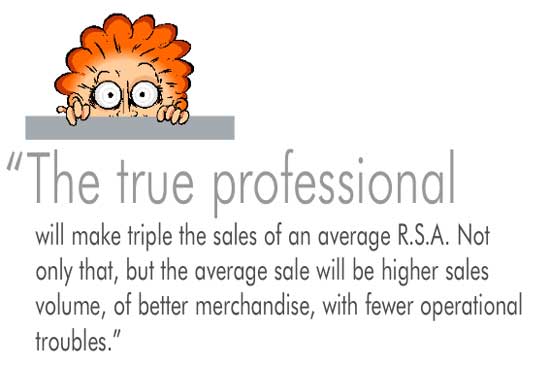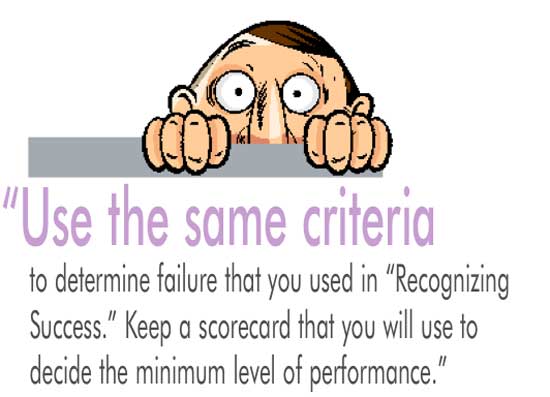
What do we do about the Retail Sales Associate (R.S.A.)? Will any store owner, distributor or manufacturer argue with me when I suggest that the R.S.A. is the “weak link” in the chain? The chain I’m referring to extends from raw materials procurement through manufacturing all the way to the consumer’s home.
Why is this? Millions of dollars are spent on research, design, development, advertising, marketing, manufacturing, etc., by manufacturers and retailers only to leave the destiny of the product in the hands of a Retail Sales Associate; all too often a recent high school graduate with two days of training and three weeks of on-the-floor experience.

Please do not think I am disparaging the professional R.S.A. who goes to the trouble to thoroughly prepare himself or herself. Then, with that training and preparation, flawlessly executes the sales principles that virtually guarantee success. The problem is, there aren’t very many R.S.A.s who fit this description. How do I know this? First, years of observation and second, I talk to a lot of people around the country about their retail experiences. The most common theme of my discussions is customers’ dissatisfaction with retail salespeople.
THE IMPORTANCE OF THE R.S.A.
Is the R.S.A. important? I think so. In fact, you could make the argument that the R.S.A. is the most important link in the whole chain, and yet is still the weakest link in that same chain. Retail stores and consumers both rely on the R.S.A. to communicate necessary information to the consumer. Rare is the store that leaves the product selection of big ticket items entirely in the hands of the consumer. Most consumers, I believe, hope that they can rely on information from the R.S.A. to make a smart decision. In the March/April 2014 issue of Furniture World, Volume 144, No.2, “Keep Control of Every Mattress Sale” article, I quoted Larry Mullins as saying “The power of the one-on-one conversation remains the most effective method of selling on earth.” The conversation Mr. Mullins is referring to is the conversation between the R.S.A. and the consumer. Therefore, in virtually every sale, the R.S.A. has participated in some way, and, conversely, the R.S.A. has probably participated in every “lost” sale, as well. So, yes, the R.S.A. isn’t just important, he is critical to a successful sales effort.
If the R.S.A. is so important, why does store management so often FAIL to hire, train and prepare the best candidates to fill the most important link in their chain? Why is this part of the business so often left to chance?
CHARACTERISTICS OF A SUCCESSFUL R.S.A
Does anyone know the characteristics of a good R.S.A? I don’t even know if I do, and I’ve been training them for over 15 years. I’ve seen big, outgoing personalities fail miserably, and quiet, unassuming personalities succeed spectacularly. And, of course, I’ve seen the opposite, as well.
I have come to believe, however, that, there are at least two characteristics that are absolutely essential to R.S.A. success.
The first characteristic is the willingness and drive to thoroughly prepare for the job. Preparing for the job means learning all the tools of the trade including mastery of both the five groups of knowledge and the sales presentation. Every successful Retail Sales Associate I’ve ever known was expert in the use of both of these critical tools.
Note that the five groups of knowledge include: product knowledge, knowledge of policies, knowledge of advertising, knowledge of inventory and knowledge of financing.
The second important characteristic is a burning desire to make the sale. Call it by whatever euphemism you want, such as desire to help the customer, etc. but every professional out there possesses what I call the “killer instinct,” which, simply said, is the drive to win, to make the sale.
Retail sales is a serious game. It is a game of winners and losers. There is no in between. The “ball” is the customer and the objective is to “score” (make the sale). The prepared R.S.A. with the burning desire to make the sale will “score” most of the time. And, as we all know, the team that scores most often, wins the game.
R.S.A. RESPONSIBILITIES
The R.S.A. is the connection between the Product and the buying customer. By the “Product”, we mean everything that goes into making the product; raw materials supplier, manufacturer, distributor, and store. The R.S.A. is, in effect, working for all of these entities.
The customer needs information. The R.S.A. should have this information. Therefore, the R.S.A.’s job is to channel information from Product to customer. To do this, the R.S.A. MUST be fully fluent (prepared) in all aspects of the Product from construction to demonstration to price.

This concept is so fundamental and undeniable, yet the floors of our showrooms are often populated with R.S.A.’s who don’t have a clue as to this basic idea. So much so, that the unprepared R.S.A. can actually be more of a liability than no R.S.A. at all.
Briefly stated then, the responsibilities of the R.S.A. are to (1) be completely prepared and (2) use that preparation to solve each customer’s problem.
FINDING AND HIRING THE POTENTIAL R.S.A.
It isn’t hard to call the newspaper and place a help-wanted ad. The hard part begins when every manner of job-seeker shows up for an interview. There are a lot more “weeds” than “flowers” in every crop of applicants. How does the interviewer sort out which is which?
Some applicants are obvious. I usually eliminate them if (a) they bring along a family member on the interview (b) they have no means of transportation (c) they have a sloppy, displeasing appearance (d) they display a serious “edge” or attitude during the interview (e) they misspell their own name on the application.
So much for eliminating undesirables. What do we look for? This is actually much harder, because a lot of candidates look good in the interview and fall completely apart during training and work. Potentially great R.S.A.’s just don’t jump out and signal, “I’m the one you are waiting for.” Once you eliminate the obvious, what is left over might have a chance to be a good candidate.
How about sales experience? Should you favor the veteran over the raw twenty year old? Maybe it’s just me, but I’ve had better luck with new, inexperienced candidates, particularly younger ones with fewer bad habits. Younger candidates also haven’t been shell-shocked by years of retail sales work. Dealing with customers can be a stressful job. Retail burn-out is real. There may not be a cure.
TRAINING
I will repeat myself yet again. The R.S.A. MUST BE PREPARED. I don’t think any initial training program less than an intense two week “boot camp” is going to be enough. My book How to Win the Battle for Mattress Sales, the Bed Seller’s Manual details a very thorough training program. If your candidate diligently learns and applies everything the book calls for, he probably has the potential to become a very capable R.S.A.
Training never ends. The boot camp is just the beginning. Just as you should follow up with sales leads, you should also follow up with advanced training for your R.S.A.s. Manufacturer’s reps are good sources of information. Request frequent product knowledge classes for all sales associates. The reps are always glad to serve.
HOW MUCH IS A GREAT RSA WORTH?
What should the sales manager expect out of his R.S.A? How much is a great R.S.A. worth? As an illustration, here is an situation I observed some years ago that will shed light on the difference between poor and superior sales work.
The story goes like this. A good many years ago, I was involved in a new store opening. The location was first rate, with a high traffic count, easy visibility, ample funding, sharp advertising, a powerful product lineup including most of the major brand names, well merchandised. We were blessed with three talented, highly prepared, professional retail sales people. The results? The store was turning over $50 per square foot in sales in the first month, which is an annualized rate of $600 per square foot. And, this was without a Grand Opening. We experienced even greater sales the second and third months. Then, all of a sudden, the proprietors had some disagreements and parted company, with one owner left in control. The professional sales people also left and found employment elsewhere.
The new and sole owner, whose ideas were much more traditional and less aggressive, brought in some trainees and a manager whose primary experience was in warehouse management, not retail sales. The results were nothing short of astonishing. Sales plunged immediately by over 80 percent. Another interested party, who did business with both the previous ownership group and the new owner, said he never realized what a difference sales people could make until he witnessed this event. His words; “I figured there would be a sales decline, but I didn’t expect anything like this. I assumed that the great location would be enough to keep sales volume at a respectable level. It is obvious to me now that the sales staff made all the difference.”
I’ve been around this business a long time. I’ve been able to observe, measure and compare: (1) great R.S.A.s (2) average R.S.A.s and (3) utterly mediocre R.S.A.s. I firmly believe that the true professional will make triple the sales that an average R.S.A. will. Not only that, but the average sale will be higher sales volume, of better merchandise, with fewer operational troubles and a much happier customer who WILL return and become a repeat customer. In the first sentence of this section, we asked the question, “What should the Sales Manager expect out of his R.S.A?” Nothing less than the performance I just described. Anything less shouts “room for improvement.”
COMPENSATION
Here, we get to the crux of the problem. Many retail stores have a compensation plan that follows the “One size fits all” practice. Everybody gets paid on the same plan. The only way the R.S.A. makes more money is to make more sales.
In this article, I am not introducing any revolutionary new compensation plan. I’m just suggesting that maybe sales management think about the idea of an “Elite R.S.A. Contingent” that is recognized and more highly paid. If you have an R.S.A. that is outselling everybody else by two to one, and he or she is not cheating, or “skating” to do this, you may have a valuable property on your hands. This is a sales person you do not want to lose. I’d like to suggest developing a way that this sales person can make more money.
Here is another idea to consider. A lot of successful, large automobile dealers employ a greeter/closer sales practice. Why do they do this? They recognize that “closing” is important, and closing is a skill that not all R.S.A.s possess, especially those with less experience. I have rarely observed this practice in furniture showrooms, but I don’t know why it wouldn’t be effective, if exercised correctly. At the car dealer, the “closer” usually makes significantly more money than the greeter. The closer also enjoys more recognition and respect.
RECOGNIZING SUCCESS (ARE THEY REALLY GOOD?)
How does sales management recognize success? This sounds like an easy question, but it is not quite as cut and dried as you might think. The sales profession is a magnet to would-be con artists, and a good con artist can fool a sales manager as easily as he can fool a customer, at least in the short run.
Here are a few clues to watch for.
First, how well did the candidate do in the training boot camp? Do they really know their Five Groups of Knowledge? Do they understand the Steps of the Sale and how to execute them? The slacker who barely got by in class is rarely going to be a top notch R.S.A.
Second, watch them on the floor. Do they execute the steps of the sale? Are they friendly and outgoing? Do they stay with their customer, or do they drop them when the first objection is voiced?
Third, measure their results. Furniture World publishes some very good articles on measuring success in sales people. Here are some things to look for; (1) what percentage of their “ups” do they close? (2) what is their average ticket sales volume, or average unit selling price (AUSP)? (3) how much of their sales volume is add-ons? (4) how well do they follow up with buyers and prospective buyers? Are they exceeding the store average in all these categories?
Fourth, even if they start out like gangbusters, are they still performing at the same pace after six months? Are they consistent in their performance?
Fifth, are they taking advantage of advanced training and learning opportunities? If you give them an advanced product knowledge test after six months, will they pass or fail?
Sixth, what do the other R.S.A.s think about them? Observe and listen to your staff, clandestinely or directly.
RECOGNIZING FAILURE
Recognizing failure is usually easier than recognizing success. The problem is, failure, like success, comes in degrees. How failed does the R.S.A. have to be before you terminate their employment? This is a decision that each store must make on its own. Here is my input on that subject. Use the same criteria to determine failure that you used in “Recognizing Success.” Keep a scorecard that you, as sales manager, will use to decide the minimum level of performance that you will tolerate before parting company with the low-performance R.S.A.
Don’t keep a low performance, disgruntled employee, R.S.A. or otherwise. That person will be toxic to the rest of your staff.
SUMMARY
Since the R.S.A. is a critical link in the chain, and great R.S.A.s are so hard to find, is there an alternative to the Retail Sales Associate? Sure, you can put out information-laden placards on all your merchandise. You can have informational videos running on every aisle. You may have a few customers that respond favorably, especially those few that “already know what they want” or “don’t like to talk to sales people.” But, watch out, if a new store opens down the street that is manned with real professional sales people. I predict they will take a large share of your sales.
So, what is the answer? Better training and better compensation. The promise of high pay will attract better people. Does anyone argue with that proposition?
Let me emphasize one more note on better training. How much training does it take to become a doctor, a lawyer, a C.P.A., a college professor, a computer programmer? Would you feel confident going to a doctor who just “got by” during his years in medical school? What about a lawyer or a C.P.A. who didn’t stay up-to-date on the newest legislation?
I’ll admit, the incompetent furniture Retail Sales Associate does not have the same capacity for damage to society as the incompetent physician. But, think about this. How much damage can the incompetent Retail Sales Associate do to your business and your finances?
In the next issues of Furniture World, we will begin a series of articles that can be used as the outline of a training curriculum. Each article will select and discuss one of the “tools of the trade” that we just mentioned.